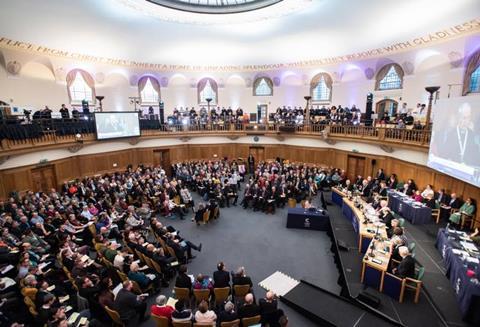Clergy in the Church of England will be able to host services of blessing and thanksgiving for couples on same-sex relationships, but not marry them. Heather Tomlinson answers your questions

Why do I keep on hearing about Synods?
The Church of England has just held an important General Synod, where recent proposals on same-sex relationships from its bishops were debated. The bishops proposed new prayers are introduced, which can be said over same-sex couples in church, following their civil marriage ceremony. These prayers have proved particularly newsworthy and controversial in the lead up to this meeting.
What is a Synod, anyway?
A Synod is a group in a church that decides things. The CofE’s General Synod is a bit like a parliament for the established church. It’s held three times a year, and all the different dioceses (which are like the local councils of the CofE) have to elect both lay people and clergy to attend these meetings. So there are a lot of ordinary Christians who can speak and vote – although it does tend to attract campaigners for change within the church. There are bishops, too.
So why’s there a fuss about prayers? I thought the church was keen on prayer.
The bishops’ proposal makes it clear that it’s more than just a prayer. The press release says the new “Prayers of Love and Faith” will “enable same-sex couples to come to church after a civil marriage or civil partnership to give thanks, dedicate their relationship to God and receive God’s blessing.”
Conservatives say this goes too far by recognising a same-sex partnership as valid in God’s sight. But they go nowhere near far enough for liberal campaigners, who want to be able to hold a gay marriage within CofE churches.
Why are they arguing about sex again?
Probably because it’s the subject where there is the biggest gap between the traditional church and mainstream culture’s more sexually permissive and pro-LGBT attitudes. There’s been a lot of pressure from government and from liberal campaigners for the Church of England to change since gay marriage was legalised in Britain in 2013 – especially as it is the ‘established Church’ and has certain privileges within the UK government.
A lot of CofE folk - vicars, bishops and ordinary people in the pew - also believe that the church’s doctrine should be changed and think that gay relationships are not sinful.
This particular bout of arguments follows a five-year consultation called “Living in Love and Faith” where bishops consulted with people of different sexualities and opinions on the matter.
Why does everyone seem so unhappy?
The “prayers of blessing” compromise that the bishops came up with doesn’t seem to have pleased anyone.
The people who want gay marriage in the church argue that they don’t go far enough. Veteran gay rights campaigner Peter Tatchell called them “an insult” as “blessings are what the Church gives to pets like dogs and guinea pigs” as he was protesting with placards outside this week’s Synod.
Aren’t they meant to love each other, and all that?
Well, being Christians, there were touches of kindness at this recent Synod. Before the debate started they handed sweets around to each other. And everyone gave Geoffrey Tattersall KC, who had the tricky task of chairing this debate, a standing ovation at the end.
They may intend to love each other, but in reality, they disagree what that looks like – and they disagree about what is true.
So when is the Church of England going to conduct gay marriages?
It doesn’t look likely, any time soon.
Can our LGBT friendly vicar bless a same-sex union this week, then?
No. The bishops are going to go away and tweak the language of the new prayers on the basis of what’s been discussed at Synod.
But if the government and the bishops want gay marriage in church, why hasn’t it happened yet?
A lot of bishops do support introducing gay marriages in CofE churches, and a number have publicly changed their minds recently. But there are still plenty of CofE folk who hold to the traditional view of marriage – and they are more likely to be in larger churches that are growing, which gives them a significant say.
However, the potential consequences of this debate are much wider than what happens in English churches. The CofE is part of the broader Anglican Communion – the third largest group of Christians after the Roman Catholic church and the Orthodox churches.
Most parts of this Communion are much more conservative than the CofE, and a number of countries have said they will leave the Anglican Communion if there is any kind of recognition of gay marriage, especially from its head, the Archbishop of Canterbury Justin Welby. It’s particularly unpopular in Africa – and Welby is reported to have said he thinks keeping the Communion together is more important than introducing gay marriage in the CofE.
So this could split the church?
Yes. Both in the wider Anglican Communion, but also in the Church of England itself.
So why did it take two days to discuss all this?
There were a lot of amendments proposed to the bishops’ new plans. In the end, the amendments were not accepted, and the Synod voted in favour of the new prayers.
But it’s not over, yet.
Both sides will be fighting to make the CofE align with their way of thinking. And either disestablishment from the British State, or a breakup of the Anglican Communion, could be the result.






































No comments yet